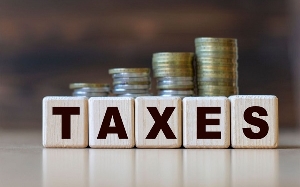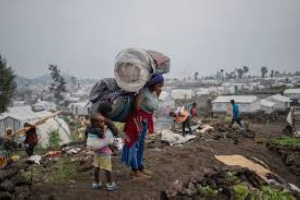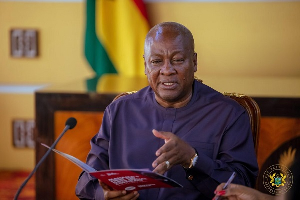The government of the New Patriotic Party is officially two years old today.
In these opening days of 2003, as the NDC is grappling with a self-inflicted wound of Rawlings and Mills turning down a seasonal gift from the state and its attendant media cacophony, and Mills is engaged in a losing battle of trying to shed off the skin of a poodle, the ruling NPP is riding on a wave of confidence and optimism.
At the end of 2002, the party was putting finishing touches to its scheduled Delegates Congress which eventually took place in the twin city of Sekondi-Takoradi this past weekend. The congress re-affirmed President Kufuor as the party's presidential candidate for Election 2004 and elected a Women's Organizer, Youth Organizer and Deputy General Secretary.
The NPP has never been in a more ebullient mood - not even when it won Election 2000.
The Sekondi-Takoradi congress was a celebration, a carnival, a harvest, a durbar, all rolled into one. Even intra-party skeptics got infected by this congress, as optimism flowed freely and prospects for 2004 looked ever brighter.
At the congress, it was a supremely confident President Kufuor whipping his party into shape and exerting his authority as never before. How else would he order all his ministers and other government functionaries back to work immediately after the congress rally, if he did not want to get the message of action across? Said an aspiring parliamentary candidate to ADM last Sunday, "He [the president] gave his orders and the ministers are going to have to be at their desks tomorrow."
But even with all that much feeling of goodwill and bright future electoral prospects, realists within the party were also quietly discussing the thorny vote-getting or vote-losing issues still begging for serious attention.
Three issues, among many, stand out as problem areas that the NPP would have to address before voters go to the cast their ballots in December 2004.
Armed Robbery
Uppermost in most minds, though not articulated openly at the congress is the issue of violent crime, especially armed robbery. In the year 2002, armed robbers terrorized the country from Paga to Tema and Aflao to Axim. The armed robbers were ruthless and shot many of their victims in cold blood. They roamed the highways and in notorious Turpin's highway robbery fashion, held up travelers and robbed them of money and belongings. Targeting trade routes like the Tamale-Techiman road, they wreaked havoc on traders.In the cities, they roamed in packs and broke down front doors to gain access into homes where their often frenzied wickedness boggled the mind.
By Christmas 2002, not even the progress of the economy featured as top priority in many people's wishes for the New Year. The three months leading to the Christmas and New Year holidays had seen a shift in the modus operandi of the robbers: car jacking. It was no more safe to drive out of the house for work or pleasure as one could lose one's car or life to the new urban terrorists.
Targeted also were visitors disembarking through the Accra International Airport. Arriving passengers would be trailed to their destinations and at gun point divested of all their belongings including their travel documents. The hardest hit were Ghanaians in the Diaspora whose homecoming was thus traumatized. ADM information sources suggested that a number of Ghanaians living abroad cancelled their travel plans to visit the homeland this past Christmas because they did not want to fall victim to the small arms fire of the robbers.
The government, in response, supplied the police with new and fast patrol vehicles and instituted military cum police search and apprehend task forces to go after the robbers, but have so far met with limited success as the robbers have not only multiplied, but have also become even more brazen.
The bloodthirsty methods of the robbers have been shocking to Ghanaians who are supposed to have a natural aversion to such wanton bloodiness and now a kind of xenophobia is creeping in with many people blaming the robberies on the influx of Nigerians into the country and also the large numbers of Liberian refugees currently residing in Ghana.
The Nigerians may not be blameless after all, because a number of the armed robbers and drug dealers who have so far been busted have included a fair number of them.
Not since the three-year curfew imposed by Rawlings after his coup of December 1981 have Ghanaians come to regard their nights with such fear and loathing. Just as the three-year curfew did, if this government does not decisively halt the armed robberies, the night economy could be destroyed entirely which could be very costly to the government's revenue base.
Frustration and some anger are seeping into popular perceptions with some people saying the effort at combating the armed robbers has not been robust enough and also "intelligence" is absent in the overall strategy. Parliament and the courts seem at best to be disinterested and at worst even abetting as when a court in Tema granted bail to an armed robbery suspect on the grounds that he was HIV positive.
As 2003 moves into election year 2004, the NPP would be held to account, even by its most ardent supporters by how it deals once and for all with the menace of armed robbery.
Paying more for petroleum products
Will they, won't they?This refrain has been on the tongues of Ghanaians most of 2002 when people started speculating as to when the government would increase the price of petroleum products. By the last quarter of 2002, there was open talk of increases around November or early December. The Minister for Energy, Mr. Kan Dapaah did not fail to exploit any chance he got in the media to drop hints about the impending price hikes.
When ADM spoke to him sometime in September 2002, he was looking for a 45% hike, but this has since been re-calculated upward. During the just ended congress, when ADM spoke to him, he said he would be asking for between 100% and 120%.
That would be the highest percentage rise in the prices of petroleum products in the history of the country. In straightforward calculations, we are talking about at least twenty one thousand cedis for a gallon of petrol, which at the prevailing dollar-cedi exchange rate of ?8,600 to the dollar, works out to a little over US$2.00 per gallon.
It would demand nerve and verve for the government to take such a monumental step, but experts and lay people are agreed that to save the energy sector in general, the Tema Oil Refinery and Ghana Commercial Bank in particular, it is a decision that has to be taken no later than end of January 2003.
This decision would immediately elicit across board price increases, whose political cost could be equally high.
The government of the 2nd Republic headed by Dr. Busia, (this current president was a Deputy Minister in that administration), was overthrown by a military coup on January 13 1972 after it had taken an equally monumental but forward-looking decision to devalue the cedi massively. That government was only 27 months in office and the devaluation was cited by the army colonel who did the coup as one of his principal reasons. As this government approaches January 13 and only three months away from its 27th month in office, and faced with the prospect of massive price increases, a certain d?j? vu would be creating much cause for concern. But no matter what the jinx it is that is giving the Kufuor administration nightmares, this is one bullet the government would have to bite very soon in order to stem the haemorraging of a ?50 billion a month subsidy that the government is shouldering as a result of the uneconomic pricing of petroleum products. Should the government "get away" with this harsh but necessary decision, then one of the greatest bugbears of the Ghanaian economy would have been solved, perhaps for ever, as subsequent increases or decreases would be fairly routine and in consonant with market forces.
Twenty one thousand cedis for a gallon of petrol...how would Ghanaians take it?
The Yendi Skin Affair
In March 2002, Ghanaians were jolted into shock and disbelief when a major traditional ruler was killed by some of his own subjects.Ya Na Yakubu Andani II, Paramount Chief of Dagbon Traditional Area, variously referred to as the King of Dagbon or the Dagbon Overload fell during an internecine skirmish which also saw the torching of his palace and the death of many others.
The gruesome manner in which the Ya Na met his end disturbed the conscience of the nation and elicited a special address by the president on radio and television.
The government instituted a commission of inquiry and criminal investigations into the conflict as the Accra-bound representatives of the two "gates" of Abudu and Andani locked horns in wars of words.
At year end a government white paper was issued on the report of the commission. A number of senior government officials were absolved while some suspects are to appear before the courts on charges of murder and other crimes associated with the disturbances.
Meanwhile the state of emergency as well as night time curfew which were instituted by the government after the death of the Ya Na are still in force.
But the major issue of succession is still outstanding. The resolution of this decades old controversy is now the lot of the NPP administration to solve to the satisfaction of the two intransigent sides. Should the government succeed in brokering an acceptable formula, it would earn it the right to expect the Nobel Peace Prize!
Other issues
* The cedi has to be stabilized. 2002 saw a downward trend against the dollar, euro and other major currencies.* The Cash & Carry and Medical Insurance
*Education reforms. PresidentialCommission's report expected to highlight the way forward
*Infrastructure development - work on roads mentioned in 2002 Sessional Address, more results expected
* Ghana Airways - final decision awaited
* Greater Discipline Campaign - enforcement expected
















